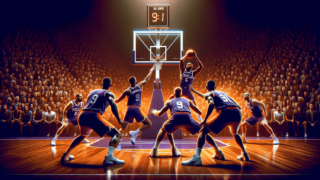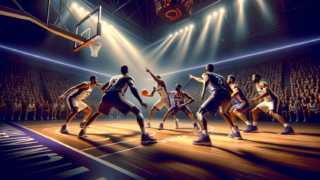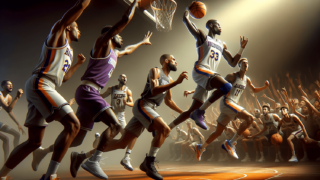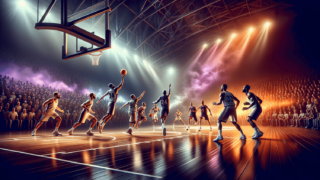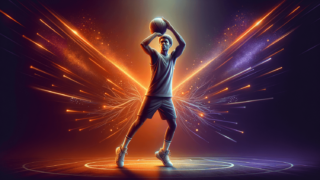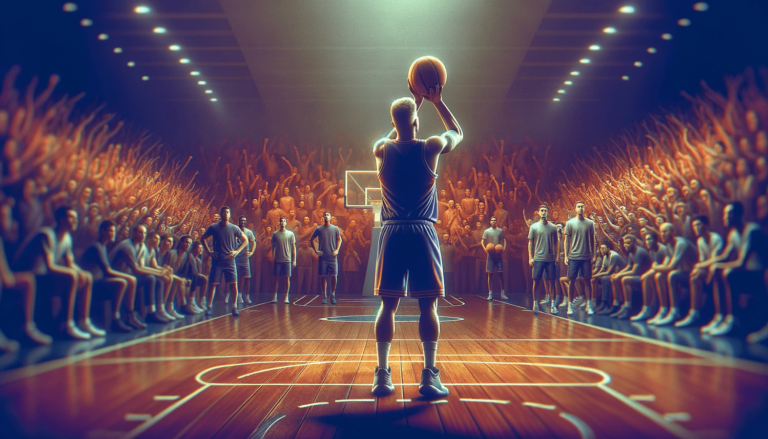
How to Improve Your Mental Toughness in Basketball?
Written by: Basketball Universe
Last updated:

Have you ever watched professional basketball players effortlessly handle pressure-packed situations and wondered how they maintain their unshakable focus? Well, the secret weapon behind their success is mental toughness! Welcome to our deep dive into the world of mental resilience in basketball—a vital skill that separates the good from the great. Get ready to elevate your game as we uncover powerful strategies and insights that will help you withstand nerve-wracking confrontations and confidently tackle whatever challenges the court may present. Fasten your sneakers and prepare to level up your mental game like never before!
How to Improve Your Mental Toughness in Basketball?
Improving mental toughness in basketball involves developing confidence, staying focused under pressure, maintaining a positive mindset, and fostering resilience. To achieve this, practice visualization, set clear goals, embrace challenges, rely on routines, and learn to reframe negative thoughts. Cultivate a good support system to enhance growth, and don’t forget to prioritize self-care, as it directly impacts your mental game. Regular meditation, drowning out distractions, and learning from mistakes can build mental strength, paving the way towards dominating the court.
Building Confidence on the Court
Confidence is a critical component of mental toughness in basketball. When you truly believe in your abilities, you’re more likely to perform well under pressure. To develop unwavering confidence, it’s essential to:
Accentuate your strengths
Become aware of your unique talents and focus on honing them. Knowing your strengths, like being an exceptional rebounder or a sharpshooter, can boost your self-esteem and make you a valuable asset to your team.
Work on your weaknesses
Though it’s crucial to focus on what you’re good at, addressing your shortcomings is just as important. By putting in the work to improve areas where you struggle, you’ll be better prepared to face any challenge.
Choose role models
Select basketball players who inspire you and learn from their journeys. Observe how they approach the game, handle adversity, and manage stress. Understanding their mindset can help mold your own.
Staying Focused Under Pressure
Focus is the ability to maintain attention on the task at hand while ignoring distractions. It’s a vital skill for enhancing your mental toughness in basketball. Here’s how:
Practice visualization
Visualize yourself performing at your peak, making difficult shots, and executing every play flawlessly. By creating a mental representation of these situations, you’ll be more prepared when they occur during games.
Develop attention control strategies
Learn to direct your focus on only what’s important. Develop cues that help reset your attention when it drifts, such as repeating a mantra or engaging in deep breathing routines.
Stay in the present
Don’t let past mistakes or future possibilities distract you; stay grounded in the present play. Remind yourself that every possession is a new opportunity to succeed.
The Power of Positivity
Maintaining a positive mindset is crucial for mental toughness. Optimistic players are more resilient and better equipped to cope with adversity. To cultivate positivity:
Reframe negative thoughts
When you face hardships on the court, catch negative thoughts and replace them with constructive ones. Eventually, this will become second nature, and your overall outlook will improve.
Set achievable goals
Set realistic, attainable objectives for yourself. Incremental progress is rewarding and will keep you motivated to push harder.
Surround yourself with support
Having a close-knit circle of coaches, family, and friends who believe in you and offer constructive criticism can help propel you to greatness.
Building Resilience in Basketball
Resilience is the ability to bounce back after experiencing adversity. Players with high resilience are mentally tougher and can adapt to the demands of the game effortlessly. Here’s how to develop resilience:
Embrace challenges
Face adverse situations head-on and view them as opportunities for growth. Seize the chance to test your limits and learn from tough experiences, instead of shying away from them.
Develop a pre-game routine
Routines can help alleviate anxiety and create a sense of stability. Establish a consistent pre-game ritual, like listening to music or stretching, to prime your mind for what’s about to unfold on the court.
Learn from failure
Reframe losses and setbacks as valuable learning experiences. Analyze what went wrong and apply those lessons to future games. Embrace a growth mindset, understanding that improvement is a continuous process.
Fueling Your Mind and Body
Your mental toughness is directly connected to your physical well-being. Taking care of your body by making healthy choices can impact how well you perform on the court. To ensure your mind and body are in top shape:
Make nutritious choices
Eat a balanced diet rich in whole foods, including quality proteins, healthy fats, and complex carbohydrates. This will provide you with the energy needed to excel during games and maintain focus.
Stay hydrated
Proper hydration is crucial for optimal cognitive functioning and physical performance. Make sure to drink an adequate amount of water, especially before, during, and after games or practices.
Rest and recover
Give your body the rest it needs. Prioritize sleep and schedule recovery days to allow your muscles and mind to recover from rigorous training and games.
Conclusion
Mental toughness is a vital component of basketball success. By focusing on confidence, focus, positivity, and resilience, you can improve your overall mental game. Don’t forget the importance of self-care and nutrition in bolstering your mental fortitude. With time, practice, and dedication, you’ll develop the mental edge to outperform the competition and elevate your performance to new heights.
Additional Strategies for Boosting Mental Toughness
Beyond the core concepts already discussed, there are a variety of supplementary techniques that can further improve your mental toughness in basketball. Consider incorporating these ideas into your routine to enhance your game and fortify your mental edge:
Adopt a mindfulness practice
Mindfulness can help you stay grounded in the present moment, enhancing your ability to focus and boosting your stress management abilities. Start including practices like deep breathing, yoga, and meditation into your training regimen. Doing so regularly can help cultivate mental toughness and promote overall well-being.
Celebrate small achievements
The path to becoming a mentally tough basketball player is paved with small victories. Don’t forget to commend yourself for those incremental accomplishments, whether it’s mastering a new move, hitting a personal shooting percentage goal, or successfully executing a defensive strategy. Recognizing progress helps maintain motivation and reinforces your belief in your abilities.
Seek out pressure situations in practice
Expose yourself to high-pressure scenarios during practice to build familiarity and confidence in such situations. Simulate game-winning shots, defensive stops, or playing with a man disadvantage. The more exposure you have to challenging conditions, the better equipped you’ll be to perform under pressure during actual games.
Develop a team-oriented mindset
Basketball is a team sport, and cultivating mental toughness involves understanding that your individual success is interconnected with your team’s success. Focus on being a good teammate by uplifting those around you and recognizing their contributions. Encourage and motivate your fellow players, which in turn, will help them improve their mental toughness and foster a resilient team spirit.
Accept imperfections as part of the process
Remember that no one is perfect, including the greatest basketball players. Learning to accept imperfections, shortcomings, and mistakes as part of the journey towards improvement can help foster mental toughness. Embrace your humanness and recognize that stumbles and setbacks are stepping stones to becoming a better athlete and person.
FAQs: Enhancing Mental Toughness in Basketball
Still left with a few burning questions about improving your mental toughness in basketball? Look no further! Here is a compilation of ten frequently asked questions and concise, informative answers that will help you better understand and navigate this crucial aspect of the game.
1. Can anyone develop mental toughness in basketball?
Yes, anyone can develop mental toughness in basketball. With consistent effort, focus, and dedication to improving your mental game, you can become a more confident, resilient, and focused player.
2. How long does it take to improve mental toughness in basketball?
There is no definitive timeline for improving mental toughness, as it varies depending on the individual and the amount of effort put in. However, consistent practice and dedication to implementing the aforementioned strategies can lead to noticeable improvements over time.
3. Will mental toughness alone make me a better basketball player?
While mental toughness is a vital aspect of becoming a successful basketball player, it is not the sole determining factor. Physical skills, such as shooting, ball-handling, and positioning, are also crucial. Developing mental toughness works in tandem with honing physical skills to create a well-rounded player.
4. What are some specific exercises that can help me build mental toughness?
Some practical exercises to enhance mental toughness include visualization, deep breathing, meditation, and goal-setting. Additionally, practice simulating high-pressure situations during training sessions to improve adaptability and confidence in those scenarios.
5. How can I tell if my mental toughness is improving?
As your mental toughness improves, you will likely notice increased confidence on the court, better focus during games, enhanced resilience to setbacks, and a more positive attitude towards challenging situations. Tracking your progress with a journal can also help you recognize patterns and improvements in your mental game.
6. Can mental toughness help me in other areas of life?
Absolutely! The principles of mental toughness, such as resilience, focus, and a positive attitude, are applicable beyond the basketball court. These skills can positively impact other aspects of life, including academics, professional settings, and personal relationships.
7. Do coaches play a role in developing a player’s mental toughness?
Yes, coaches play a significant role in fostering mental toughness by creating a supportive and challenging environment for players. Effective coaching involves offering constructive criticism, encouragement, and providing opportunities for players to face adversity and grow.
8. How important is self-awareness in building mental toughness?
Self-awareness is critical in building mental toughness, as it enables you to identify both your strengths and weaknesses. Understanding your mental and physical limitations allows for targeted growth and improvement, ultimately contributing to a stronger mental game.
9. How do I maintain my mental toughness during high-pressure games?
Maintain mental toughness during high-pressure games by practicing pre-game rituals, focusing on deep, controlled breathing, and engaging in positive self-talk. Remind yourself of your strengths and past successes, and stay engaged in the present moment.
10. Can building mental toughness help with injury recovery?
Yes, mental toughness can aid in injury recovery, as resilience and focus are crucial components of overcoming physical setbacks. A positive mindset, determination, and patience can help shorten recovery duration and allow for a smoother return to the court.
Featured Posts
- No pillar pages found.
